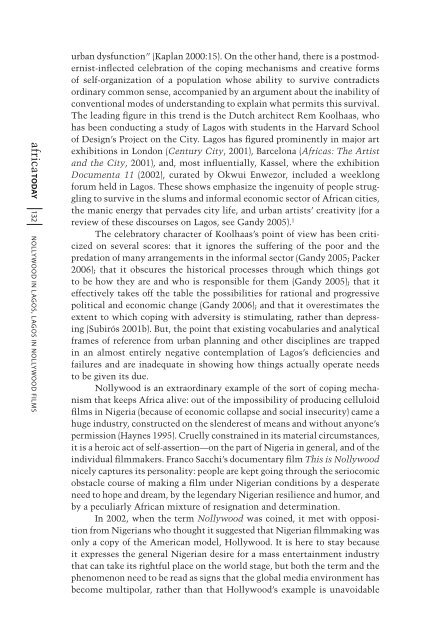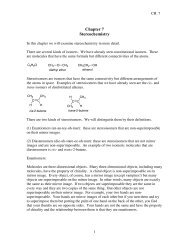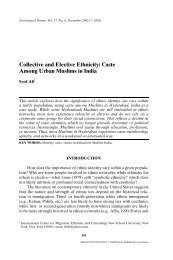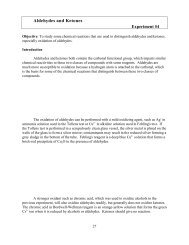Lagos is the ground of the films, not just in the sense that ... - myweb
Lagos is the ground of the films, not just in the sense that ... - myweb
Lagos is the ground of the films, not just in the sense that ... - myweb
You also want an ePaper? Increase the reach of your titles
YUMPU automatically turns print PDFs into web optimized ePapers that Google loves.
africa today 132 Nollywood <strong>in</strong> <strong>Lagos</strong>, <strong>Lagos</strong> <strong>in</strong> Nollywood Filmsurban dysfunction” (Kaplan 2000:15). On <strong>the</strong> o<strong>the</strong>r hand, <strong>the</strong>re <strong>is</strong> a postmodern<strong>is</strong>t-<strong>in</strong>flectedcelebration <strong>of</strong> <strong>the</strong> cop<strong>in</strong>g mechan<strong>is</strong>ms and creative forms<strong>of</strong> self-organization <strong>of</strong> a population whose ability to survive contradictsord<strong>in</strong>ary common <strong>sense</strong>, accompanied by an argument about <strong>the</strong> <strong>in</strong>ability <strong>of</strong>conventional modes <strong>of</strong> understand<strong>in</strong>g to expla<strong>in</strong> what permits th<strong>is</strong> survival.The lead<strong>in</strong>g figure <strong>in</strong> th<strong>is</strong> trend <strong>is</strong> <strong>the</strong> Dutch architect Rem Koolhaas, whohas been conduct<strong>in</strong>g a study <strong>of</strong> <strong>Lagos</strong> with students <strong>in</strong> <strong>the</strong> Harvard School<strong>of</strong> Design’s Project on <strong>the</strong> City. <strong>Lagos</strong> has figured prom<strong>in</strong>ently <strong>in</strong> major artexhibitions <strong>in</strong> London (Century City, 2001), Barcelona (Africas: The Art<strong>is</strong>tand <strong>the</strong> City, 2001), and, most <strong>in</strong>fluentially, Kassel, where <strong>the</strong> exhibitionDocumenta 11 (2002), curated by Okwui Enwezor, <strong>in</strong>cluded a weeklongforum held <strong>in</strong> <strong>Lagos</strong>. These shows emphasize <strong>the</strong> <strong>in</strong>genuity <strong>of</strong> people struggl<strong>in</strong>gto survive <strong>in</strong> <strong>the</strong> slums and <strong>in</strong>formal economic sector <strong>of</strong> African cities,<strong>the</strong> manic energy <strong>that</strong> pervades city life, and urban art<strong>is</strong>ts’ creativity (for areview <strong>of</strong> <strong>the</strong>se d<strong>is</strong>courses on <strong>Lagos</strong>, see Gandy 2005). 1The celebratory character <strong>of</strong> Koolhaas’s po<strong>in</strong>t <strong>of</strong> view has been criticizedon several scores: <strong>that</strong> it ignores <strong>the</strong> suffer<strong>in</strong>g <strong>of</strong> <strong>the</strong> poor and <strong>the</strong>predation <strong>of</strong> many arrangements <strong>in</strong> <strong>the</strong> <strong>in</strong>formal sector (Gandy 2005; Packer2006); <strong>that</strong> it obscures <strong>the</strong> h<strong>is</strong>torical processes through which th<strong>in</strong>gs gotto be how <strong>the</strong>y are and who <strong>is</strong> responsible for <strong>the</strong>m (Gandy 2005); <strong>that</strong> iteffectively takes <strong>of</strong>f <strong>the</strong> table <strong>the</strong> possibilities for rational and progressivepolitical and economic change (Gandy 2006); and <strong>that</strong> it overestimates <strong>the</strong>extent to which cop<strong>in</strong>g with adversity <strong>is</strong> stimulat<strong>in</strong>g, ra<strong>the</strong>r than depress<strong>in</strong>g(Subirós 2001b). But, <strong>the</strong> po<strong>in</strong>t <strong>that</strong> ex<strong>is</strong>t<strong>in</strong>g vocabularies and analyticalframes <strong>of</strong> reference from urban plann<strong>in</strong>g and o<strong>the</strong>r d<strong>is</strong>cipl<strong>in</strong>es are trapped<strong>in</strong> an almost entirely negative contemplation <strong>of</strong> <strong>Lagos</strong>’s deficiencies andfailures and are <strong>in</strong>adequate <strong>in</strong> show<strong>in</strong>g how th<strong>in</strong>gs actually operate needsto be given its due.Nollywood <strong>is</strong> an extraord<strong>in</strong>ary example <strong>of</strong> <strong>the</strong> sort <strong>of</strong> cop<strong>in</strong>g mechan<strong>is</strong>m<strong>that</strong> keeps Africa alive: out <strong>of</strong> <strong>the</strong> impossibility <strong>of</strong> produc<strong>in</strong>g celluloid<strong>films</strong> <strong>in</strong> Nigeria (because <strong>of</strong> economic collapse and social <strong>in</strong>security) came ahuge <strong>in</strong>dustry, constructed on <strong>the</strong> slenderest <strong>of</strong> means and without anyone’sperm<strong>is</strong>sion (Haynes 1995). Cruelly constra<strong>in</strong>ed <strong>in</strong> its material circumstances,it <strong>is</strong> a heroic act <strong>of</strong> self-assertion—on <strong>the</strong> part <strong>of</strong> Nigeria <strong>in</strong> general, and <strong>of</strong> <strong>the</strong><strong>in</strong>dividual filmmakers. Franco Sacchi’s documentary film Th<strong>is</strong> <strong>is</strong> Nollywoodnicely captures its personality: people are kept go<strong>in</strong>g through <strong>the</strong> seriocomicobstacle course <strong>of</strong> mak<strong>in</strong>g a film under Nigerian conditions by a desperateneed to hope and dream, by <strong>the</strong> legendary Nigerian resilience and humor, andby a peculiarly African mixture <strong>of</strong> resignation and determ<strong>in</strong>ation.In 2002, when <strong>the</strong> term Nollywood was co<strong>in</strong>ed, it met with oppositionfrom Nigerians who thought it suggested <strong>that</strong> Nigerian filmmak<strong>in</strong>g wasonly a copy <strong>of</strong> <strong>the</strong> American model, Hollywood. It <strong>is</strong> here to stay becauseit expresses <strong>the</strong> general Nigerian desire for a mass enterta<strong>in</strong>ment <strong>in</strong>dustry<strong>that</strong> can take its rightful place on <strong>the</strong> world stage, but both <strong>the</strong> term and <strong>the</strong>phenomenon need to be read as signs <strong>that</strong> <strong>the</strong> global media environment hasbecome multipolar, ra<strong>the</strong>r than <strong>that</strong> Hollywood’s example <strong>is</strong> unavoidable
















